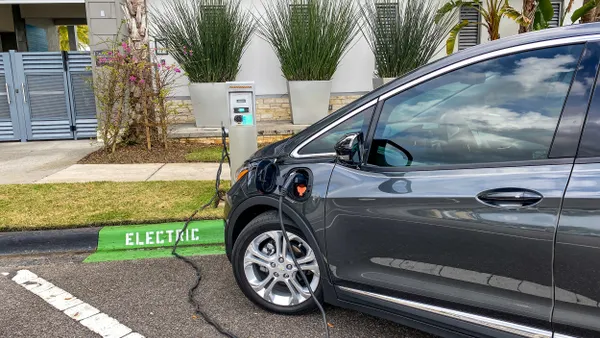Dive Brief:
- Michigan Gov. Gretchen Whitmer, D, and partners from the public and private sectors unveiled Thursday plans for a first-in-the-nation 40-mile dedicated corridor for autonomous vehicles (AVs) and connected vehicles between Detroit and Ann Arbor.
- Known as the Michigan Connected and Automated Vehicle Corridor Project, the AVs will operate in dedicated lanes with the infrastructure necessary to support their deployment. Officials said the project, which has a bevy of public and private partners and will be led by Sidewalk Infrastructure Partners (SIP) subsidiary Cavnue, will improve connectivity, transportation equity and safety in the region.
- Whitmer said the corridor shows Michigan’s commitment to finding new mobility solutions and will also play a role in helping the state’s economy recover from the ravages of the new coronavirus pandemic (COVID-19). "This reinforces Michigan's current position as a global leader in mobility innovation, and it also keeps us moving forward on a path to a more equitable, safe and environmentally conscious state," Whitmer said during a press conference.
Dive Insight:
The project's first phase will test various technologies and explore the feasibility of the corridor, with that first phase expected to last approximately two years. And it represents a major initiative for new Chief Mobility Officer Trevor Pawl, who heads up the state’s just launched Office of Future Mobility and Electrification (OFME). During the press conference, Pawl said the new corridor will shape the future of mobility globally. "Today, we begin building the road of the future," Pawl said.
It comes with Ford Motor Company, one of the project’s partners, having flexed its financial muscle in the Detroit area in recent times. In 2018, Ford bought the iconic Michigan Central Station in the city and a renovated clothing factory, with a view to spending $750 million and employing 5,000 people in the city to design and engineer the cars of the future.
The company's executive chairman, Bill Ford, said during the press conference that the purchase and this effort are interwoven, as the company is keen to find new ways to connect communities and cut emissions. "We must build for the world that we're moving into, not the world that we’ve known," Ford said.
For SIP, this is a major project too, after Google parent Alphabet announced the launch of the holding company last year, then withdrew from the controversial Quayside smart city project in Toronto in May. Officials said in a blog post its subsidiary Cavnue is focused on building the future of roads, and with this effort is looking ahead to when AVs and connected vehicles are more widely available. "This will be a road of the future and to the future," Jonathan Winer, SIP co-founder and co-CEO, said during the press conference.
Other elected leaders said it shows Michigan's willingness to innovate in a variety of areas, something already demonstrated with the American Center for Mobility in Ypsilanti, one of a select few AV proving grounds in the United States. Rep. Rashida Tlaib, D-MI, said Michigan's "open-door policy" to innovation and different ways of thinking will serve it well.
"With the creation of this corridor, we will create change even further with mobility, and we will show the world the reality of an accessible and just transportation system for the future," Tlaib said during the press conference.












